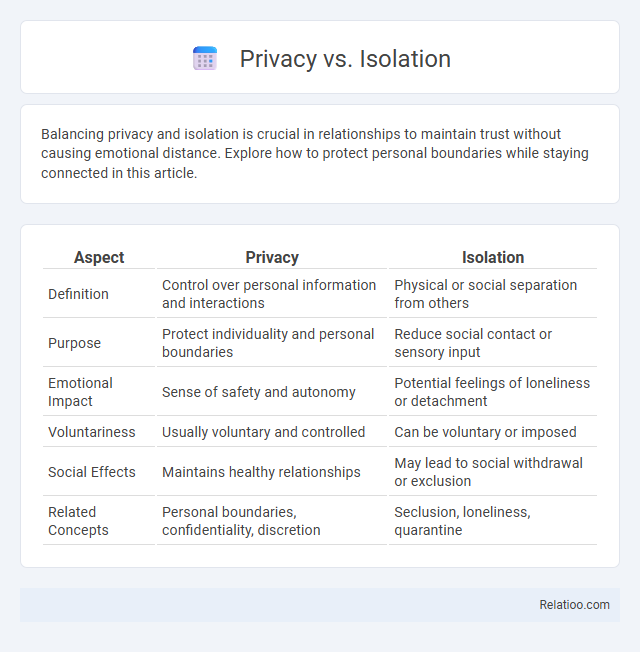Balancing privacy and isolation is crucial in relationships to maintain trust without causing emotional distance. Explore how to protect personal boundaries while staying connected in this article.
Table of Comparison
| Aspect | Privacy | Isolation |
|---|---|---|
| Definition | Control over personal information and interactions | Physical or social separation from others |
| Purpose | Protect individuality and personal boundaries | Reduce social contact or sensory input |
| Emotional Impact | Sense of safety and autonomy | Potential feelings of loneliness or detachment |
| Voluntariness | Usually voluntary and controlled | Can be voluntary or imposed |
| Social Effects | Maintains healthy relationships | May lead to social withdrawal or exclusion |
| Related Concepts | Personal boundaries, confidentiality, discretion | Seclusion, loneliness, quarantine |
Understanding Privacy and Isolation
Understanding privacy involves recognizing your right to control access to your personal space and information, ensuring your boundaries are respected in various environments. Isolation refers to a state where you are physically or emotionally separated from others, which can impact mental health if prolonged or unwanted. Your ability to differentiate between seeking privacy for comfort and experiencing isolation is crucial for maintaining emotional well-being and social connections.
Key Differences Between Privacy and Isolation
Privacy refers to the right or condition of being free from unauthorized observation or intrusion, allowing individuals to control access to their personal information and space. Isolation is a physical or social state of being separated from others, often imposed or involuntary, which can lead to feelings of loneliness or disconnection. Alone time is a voluntary and intentional period spent by oneself for rest, reflection, or personal growth, distinguishing it from enforced isolation and emphasizing autonomy and mental well-being.
Historical Perspectives on Privacy vs Isolation
Historical perspectives on privacy reveal its evolution from physical seclusion in ancient societies to conceptual boundaries in modern communal living. Isolation traditionally served survival purposes, such as protection from dangers or illnesses, while privacy emerged as a social construct emphasizing individual autonomy and confidentiality. These distinctions reflect cultural shifts where privacy gained importance alongside urbanization and digital connectivity, reshaping how solitude and personal space are perceived.
The Psychological Impact of Privacy and Isolation
Privacy provides essential psychological benefits by allowing you to control your environment and maintain personal boundaries, which helps reduce stress and enhance emotional well-being. Isolation, however, can lead to feelings of loneliness, anxiety, and depression when prolonged or involuntary, impacting mental health negatively. Alone time, when chosen purposefully, supports introspection and cognitive restoration, balancing the need for social interaction and individual mental clarity.
Privacy in the Digital Age
Privacy in the digital age is crucial as personal data is constantly collected, shared, and potentially exploited across online platforms. Protecting your privacy involves using encryption, strong passwords, and managing digital footprints to prevent unauthorized access and identity theft. Unlike isolation or alone time, which relate to social and emotional boundaries, privacy specifically safeguards your personal information and digital autonomy in an interconnected world.
Social Consequences of Isolation
Isolation can lead to significant social consequences, including diminished social skills, increased feelings of loneliness, and potential mental health issues like depression and anxiety. Unlike privacy, which allows You to control personal boundaries without severing social connections, isolation often results in reduced interaction and weakened relationships. Prolonged alone time without social engagement may undermine Your emotional well-being and lead to a sense of social disconnection.
Balancing Connectivity and Solitude
Balancing connectivity and solitude requires understanding the distinctions between privacy, isolation, and alone time to maintain mental well-being. Privacy allows you to control access to your personal space and information, ensuring comfort without complete disconnection. Alone time fosters self-reflection and rejuvenation, while isolation can lead to negative effects when prolonged, making it essential to find a healthy middle ground between social interaction and solitude.
Privacy Laws and Their Influence on Society
Privacy laws such as the GDPR and CCPA establish critical frameworks that protect individuals' personal information, fostering a societal expectation of privacy beyond mere physical isolation or alone time. These regulations influence how organizations handle data, promoting transparency and consent, which strengthens trust between individuals and institutions. The legal emphasis on privacy rights shapes social norms by distinguishing the protection of personal data from the simple desire for solitude or isolation.
Technology’s Role in Shaping Privacy and Isolation
Technology significantly shapes privacy and isolation by redefining digital boundaries and personal space. While privacy concerns escalate due to data tracking and surveillance technologies, isolation can both increase and decrease depending on virtual connectivity and social media use. Devices and platforms mediate alone time, often blurring the lines between solitude, social interaction, and digital exposure.
Strategies for Achieving Healthy Privacy Without Isolation
Maintaining healthy privacy without isolation involves setting clear boundaries to protect Your personal space while staying connected with others. Strategies include scheduling regular alone time for self-reflection and mental recharge, communicating openly about Your needs to avoid misunderstandings, and engaging in social activities that respect Your privacy preferences. Balancing these approaches helps preserve emotional well-being and fosters meaningful relationships.

Infographic: Privacy vs Isolation
 relatioo.com
relatioo.com